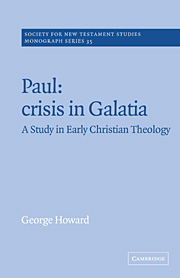Book contents
- Frontmatter
- Contents
- Preface to the first edition
- Preface to the second edition
- Introduction to the second edition
- Abbreviations
- 1 Paul's opponents in Galatia
- 2 Paul the apostle to the Gentiles
- 3 Justification by faith
- 4 Paul's view of the law
- Notes
- Bibliography
- Index of subjects and names
- Index of passages quoted
Introduction to the second edition
Published online by Cambridge University Press: 22 September 2009
- Frontmatter
- Contents
- Preface to the first edition
- Preface to the second edition
- Introduction to the second edition
- Abbreviations
- 1 Paul's opponents in Galatia
- 2 Paul the apostle to the Gentiles
- 3 Justification by faith
- 4 Paul's view of the law
- Notes
- Bibliography
- Index of subjects and names
- Index of passages quoted
Summary
The first edition of Paul: Crisis in Galatia (hereafter Crisis) appeared in 1979. Now ten years later I return to the subject of Galatians to find that Pauline studies in general is a sea of controversy that needs to be addressed before critical attention can be given to Galatians. For the second edition of Crisis, however, I have been permitted to add only a few pages to the original. Sufficient space to do justice to even one of the above ideas is hardly available. In the meantime my own understanding of Paul's situation in Galatians has changed due largely to my recent interest in early Jewish Christianity. It has been necessary, therefore, to narrow the following narrative to include material that seems to be the most crucial for a new edition of Crisis. I have chosen to present my own developed views about the situation in Galatians by discussing once again the issue of Paul's opponents, by reexamining the Antioch incident recorded in Gal. 2:11–14, and by attempting to pinpoint Paul's position regarding the Gentiles. Finally, I return to the phrase πιστιζ χριστον which I find to be of particular significance.
Paul's opponents
In recent years scholars have become increasingly aware of the difficulty of knowing who Paul's opponents in Galatia were. Considerable attention has been given to what has come to be called ‘mirror reading’, that is, the attempt to understand the position of the opponents by reversing Paul's defensive statements.
- Type
- Chapter
- Information
- Paul: Crisis in GalatiaA Study in Early Christian Theology, pp. xiii - xxxivPublisher: Cambridge University PressPrint publication year: 1990



